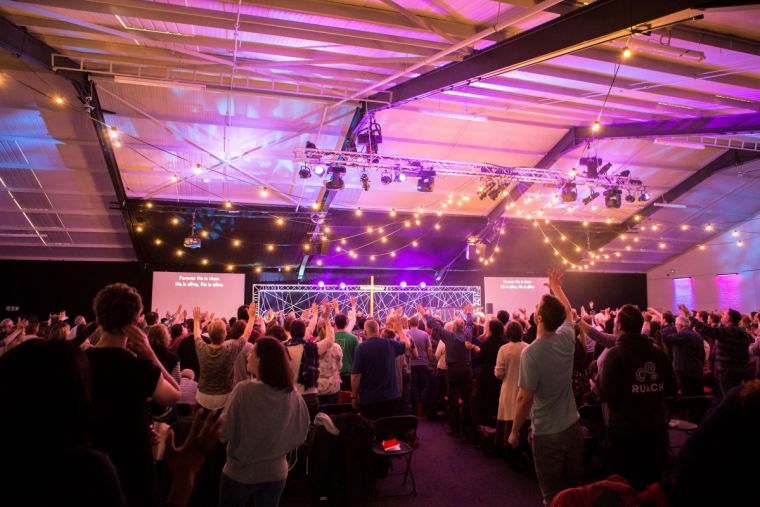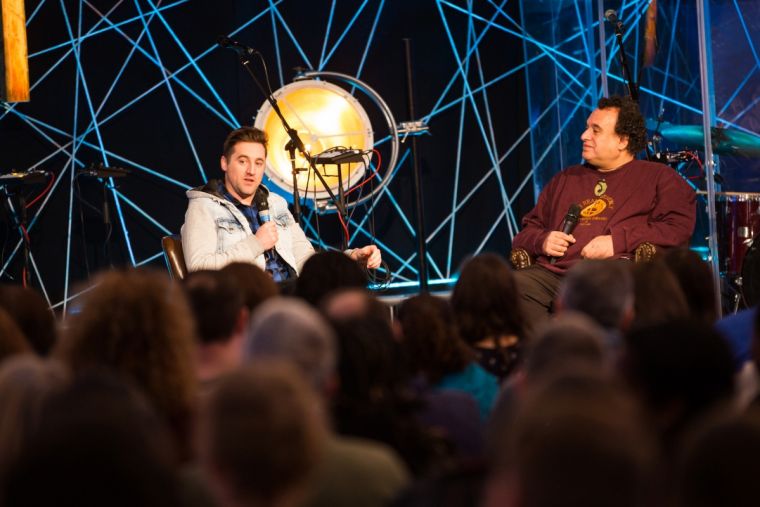What I Learned At Soul Survivor's #NaturallySupernatural Conference

What does it mean to be Naturally Supernatural?
Last week Soul Survivor, a charismatic church and ministry based in the United Kingdom but now with connections across the world, hosted its 'Naturally Supernatural' winter conference. Christian Today had a chance to attend.
This conference, held in Watford, England, aims to help people 'encounter the life-changing presence of Jesus' and aims that 'we would leave...more in love with him, more aware of his presence and better equipped to carry that love and presence to others'.
As you might guess from the title, this conference aims to balance the 'supernatural' – relying on the power of God, particularly displayed through the gifts of the Spirit such as healing and prophecy – with the 'natural', emphasising how this is a call for all Christians in their ordinary, everyday lives. Here are five things I learned from my visit to Naturally Supernatural.
Word and Spirit
'If we're going to live naturally supernatural lives, we need the ongoing experience of God's word, and God's Spirit. We need Scripture, and the presence and power of God.'
So said Bishop Graham Cray, laying out the theological groundwork for the thinking behind Naturally Supernatural. Cray was keen to emphasise the crucial balance of both 'word' and 'Spirit'. To ignore the supernatural, experiential aspects of God's work misses out on the complete ministry of God, and seeks to live independent of his power. Conversely, to rely only on 'charismatic' experiences of the Spirit whilst ignoring the Bible is to venture inwards while rejecting God's written testimony.
'If it's not scriptural, then no matter how "charismatic" it is, then it's not of the Holy Spirit,' Cray said. Scripture tests our experiences, while simultaneously the Spirit helps us understand Scripture – both work together.
In the Gospels, Jesus chastises the Sadducees, asking: 'Are you not in error because you do not know the Scriptures or the power of God?' (Mark 12:24) Both word and Spirit point to Jesus, together, and in different ways. The Bible tells us about Jesus Christ, narrating the story of salvation in which Christians find their identity and security. The Spirit comes as a gift from and a promise of the future, addressing the world and present in which we live, by working through us.
'The Spirit doesn't come to make the Church relevant, or contemporary, but to make it prophetic,' Cray said. As he summarised it: 'Stay rooted in God's word, and always always always do what the Holy Spirit says.'
How to grow up
The conference emphasised that the ministry of the Holy Spirit is not simply about having spectacular experiences, but about growing deeply in relationship with God. Andy Croft, pastor of Soul Survivor spoke about what it means to grow in faith. Faith is necessary to the Christian life, Croft said, but so often we try and live without it.
We resist faith because it's scary, and we fear dependency and the loss of our own security. And yet the Bible so often calls us to it. True faith, Croft said, is both trust and action together. It is something that is lived out, a belief that results in certain risks and concrete life choices we wouldn't otherwise make.
'What's the next step in trusting God with our lives?' Croft invited us to consider. 'When was the last time it got scary?' Croft explored the radical faith of James Hudson Taylor, whose missionary life in China involved much risk and sacrifice, trusting in the power and provision of God. Taylor's opportunities to see the miraculous and supernatural only came because he was willing to step out and put himself into those risky, challenging situations.
Likewise, Croft invited people to consider how they might be able to step out and expect the supernatural gifts of God in their own lives, being willing to practise gifts such as words of knowledge, prophecy and healing. Taking the risk of approaching a stranger with what you believe God may be saying to that person is difficult, but it is also only through taking that risk that someone might get to witness the power and grace of God.
As Croft put it: 'If we get it wrong, nobody dies. If we get it right, somebody could come alive.'

Reality and community
I was grateful for the way in which the conference emphasised that the 'supernatural' life has far more to do with the ordinary than the spectacular, and is to be found not as individuals, but in community.
A criticism of 'charismatic' ministries is that through their emphasis on the ecstatic and miraculous they merely manipulate 'hype' to feign experiences for the masses. For critics such gatherings may be at best deceptive, and at worst dangerously manipulative.
Mike Pilavachi, who began Soul Survivor ministries in the early 90s is well aware of this, and always makes an effort to play down any sense of 'hype'. He has no interest in theatrics (though he is very good at making people laugh), and instead invites people to have authentic, unforced encounters with God. He emphasises that people's 'experiences', whether they be laughing, shaking, crying or silence – are not about those people being 'special' but about an experience of healing and meeting with God specific to each individual. His self-deprecating style means you know you're not in the presence of a showman but someone who is humbly seeking and expecting God. He also doesn't wear a shiny white suit, or – as far as I could see – slap anyone around the head. Which is always promising.
Lastly, a sense of community pervaded the conference. Obviously, it was a community – about 600 people gathered for each meeting, with delegates from all over the world attending – but in its ethos it emphasised the supernatural life as one to be lived together, as a whole church. 'Loneliness is the curse of our age,' Pilavachi said, 'We need each other.'
This is a ministry clearly concerned with equipping the whole Church with what it perceives as the whole ministry of God. Some do not believe in the contemporary practice of the gifts of the Spirit. Others do believe, but still make little space for such ministry in their churches. If the team at Naturally Supernatural are right, then there's a whole aspect of ministry that many churches ignore, and people will be missing out as a result.
I'm always challenged by attending Soul Survivor meetings, which is probably a good thing. It seems right that God should make us a little uncomfortable, and that he himself shouldn't be entirely predictable. I believe what the Bible teaches about the 'supernatural' but I tend to make little space for it in my life; pretending you're in control is much easier. I have many questions and personal struggles with such ministries too, but I'm grateful that Soul Survivor are keen to 'demystify ministry', engaging with theology, people's questions, whilst dialling down the hype and looking to God.
The next step for Naturally Supernatural is its new summer conference, which will run from July 22-27 at Staffordshire Showground. More details can be found here.
You can follow @JosephHartropp on Twitter











